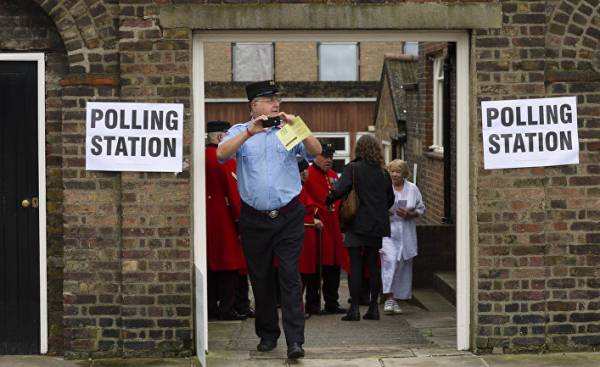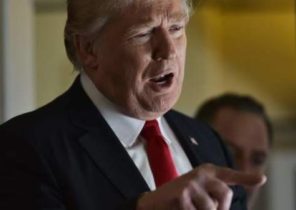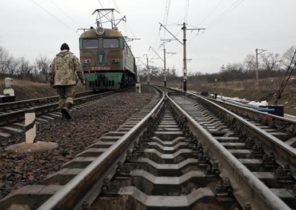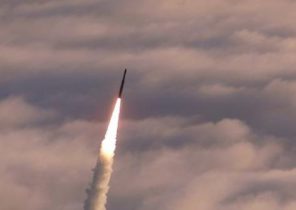
The British Parliament approved a bill on the country’s withdrawal from the European Union. It is expected that the document will be signed by the Queen and will come into force on Tuesday. Thus, Prime Minister Theresa may will formally notify Brussels of the intention of London to leave the EU — and thereby give effect to Article 50 of the Lisbon Treaty.
Russia has repeatedly mentioned in the context of “breccia” as an interested party. How it corresponds to reality?
Supporters of the EU believe that the Kremlin is secretly supported “brakcet” in order to weaken the European Union. Former U.S. Ambassador to Russia Michael McFaul called the results of the British referendum victory for the foreign policy of Vladimir Putin.
But not all experts share this opinion. We tried to understand how a withdrawal of Britain from the EU affect relations between London and Moscow.
“The situation is much more complicated”
Many analysts agree that the negotiations on the “broksita” can play into the hands of Vladimir Putin.
It is believed that Moscow is easier to work with disparate countries than with the United Europe.
In addition, the “brakcet” can weaken US influence in European politics, which is also beneficial to the Kremlin.
“The UK and the US have always had a special relationship. And Britain, being part of the EU, could bring Atlantic view in European politics. Now the opportunity for such influence is reduced,” — said a senior analyst at the London Institute of public administration David Clarke.
British MPs call to review relations with Moscow
British General: Putin has chosen a dangerous path
However, some policies — for example, the head of the foreign Affairs Committee of the house of Commons of the British Parliament Crispin blunt has warned that the development of relations between London and Moscow will be affected by private players.
“The world is becoming more complex not only because of a “breccia”. This is not the cold war. Then the relationship was pretty static, and manage was pretty easy, it was possible to plan the allocation of resources. But now the situation is much more complicated. The situation is affected not only public but also non-state actors. This should be considered,” said blunt.
“And why should we improve relations with Moscow?”
In General, the policy of Britain towards Russia remains quite rigid.
London has consistently condemned Moscow’s actions in Syria, the annexation of Crimea and Russia’s role in the conflict in Eastern Ukraine (Kremlin, the participation of Russian troops in the fighting in the Donbas has consistently denied).
Apparently, this position is unlikely to change in the near future.
“It is unlikely that Russia is at the top of the list of countries with which Theresa may would like to establish a relationship after the “breccia”. It’s not clear what Britain can gain from improving relations with Moscow”, — said the head of foreign policy Department of the analytical Centre for European reform Ian bond.
“London is not so much involved in politics in the middle East. Moreover, it is not obvious that Russia’s actions in Syria can give some dividends to the security of the UK,” he continues.
According to sources bi-Bi-si the British Parliament in the near future London is likely to continue with hawkish policy toward Moscow.
In the British establishment, the prevailing view is that Russia should be treated cautiously.
Moreover, relations between London and Moscow are the pain points — such as the investigation into the murder of Alexander Litvinenko and the case of the death of Sergei Magnitsky.
The NATO factor
The holder иллюстрацииGetty ImagesImage captionПозиция the UK in NATO — an important trump card Theresa may in negotiations with the EU on conditions of “breccia”, analysts say.
UK carries about a quarter of total European defense spending and pays about 15% of all military operations carried out by European forces.
Britain is one of two countries in Europe with nuclear weapons (along with France).
Weaken “brakcet” the defense of Europe?
British General: NATO needs a “hybrid containment” of Russia
The UK’s position in NATO is an important trump card Theresa may in negotiations with the EU on conditions of “breccia”.
“During the negotiations on the “broksita” Britain is important to show that despite coming out of the EU, it does not turn back to the topic of European security. In such circumstances, attempts to improve relations with Putin can send unwanted signals to the Baltic countries, Poland and Sweden”, says Ian bond.
A similar opinion was expressed by the former Deputy commander of the NATO forces in Europe General Richard Shirreff.
“Pexit is the opportunity to build new relations with Russia, — he told in interview to Russian service Bi-bi-si. — But Britain needs to protect their interests and most important principles of international relations. Therefore, negotiations with Moscow should be conducted only from a position of strength.”
“The position on sanctions is very clear”
Britain was one of the main initiators of sanctions against Russia after the annexation of Crimea and the outbreak of armed conflict in the Donbass and remains an active supporter of their extension.
“The UK position on sanctions against Russia clear. We will insist on maintaining sanctions until the Minsk agreements are fully implemented,” said Theresa may at the end of January.
The position of London on this issue is unlikely to change in the near future, analysts say.
But “brakcet” may affect how this issue will be discussed in the European Union. Now the decision to extend the restrictive measures against Russia discussed by the member countries of the EU every six months.
After the completion of the negotiations on the “broksita” Britain will not sit at the same table with European leaders during these negotiations.
“This increases the likelihood that the sanctions against Russia in this case will be removed, and it will happen sooner than if Britain remained in the EU,” says David Clark.
In search of partners
The process of withdrawal of Britain from the EU and the common economic space means that you need to look for new trading partners.
But British experts agree in opinion that the Russian-British trade relations is unlikely to change significantly.
“Against Moscow continue to apply sanctions and Russia’s economic policy is protectionism. All this significantly reduces the field to business contacts”, — the analyst of Department of investigation of the Economist Alex NUYS.
Prior to the sanctions, one of the most important areas of cooperation between Britain and Russia was oil and gas sphere.
According to the Nays, and now it is in this industry remains the greatest potential for new agreements. However, this is only possible in case of lifting of sanctions.
To attract in Britain, more and more Russian companies may continuing decline of the British currency.
“The lower the pound falls, the more you can buy for your money. It can attract investors. But there is a flip side to the coin. To receive substantial profits in this case, you need to have a large trade turnover”, — said bond.
The analysts note that to predict the dynamics of the pound in the foreseeable future will be very difficult. Too many factors influence it.
From Russia with money…
Britain has always been a magnet for private investors from Russia. To change it after “breccia”?
“The attractiveness of Britain for investors after the “breccia” drop. Usually, investors want to have access to a wide market, markets of several countries. And that makes for them the attachment to the EU more attractive,” notes Clark.
On the other hand, Theresa may hinted that if the agreement with the EU will not be reached, it could turn Britain into an offshore financial centre with low tax rates.
And in this case, Britain will become even more attractive for private investors from Russia.
Why squatters house of the Russian businessman in London
The government of David Cameron talked about the need to deal with that, where are the money of individual investors, including immigrants from Russia.
Cameron admitted that most real estate in the UK buy via “anonymous shell companies, sometimes using illegally obtained or laundered funds”.
He urged the British to make the property market more transparent.
I wonder what Theresa may has not yet made any statements on this topic.
“For me this is a very exciting signal, says Ian bond. — Britain already has a rather light legislation in many areas. And the idea that we can deliberately make ourselves an attractive place for “quick money” without asking too many questions — all this seems to me a dangerous idea”.
His colleague Alex NUYS notes that even after leaving the EU, Britain will retain a number of advantages in the eyes of people with more money from Russia.
“Despite the forthcoming turbulence in connection with negotiating the terms of “breccia”, Britain is a state, both feet on the ground. The advantages are clear and the rule of law, independence of the judiciary, as well as what here to speak English which is familiar to many Russian businessmen and oligarchs”, — sums up NUYS.







